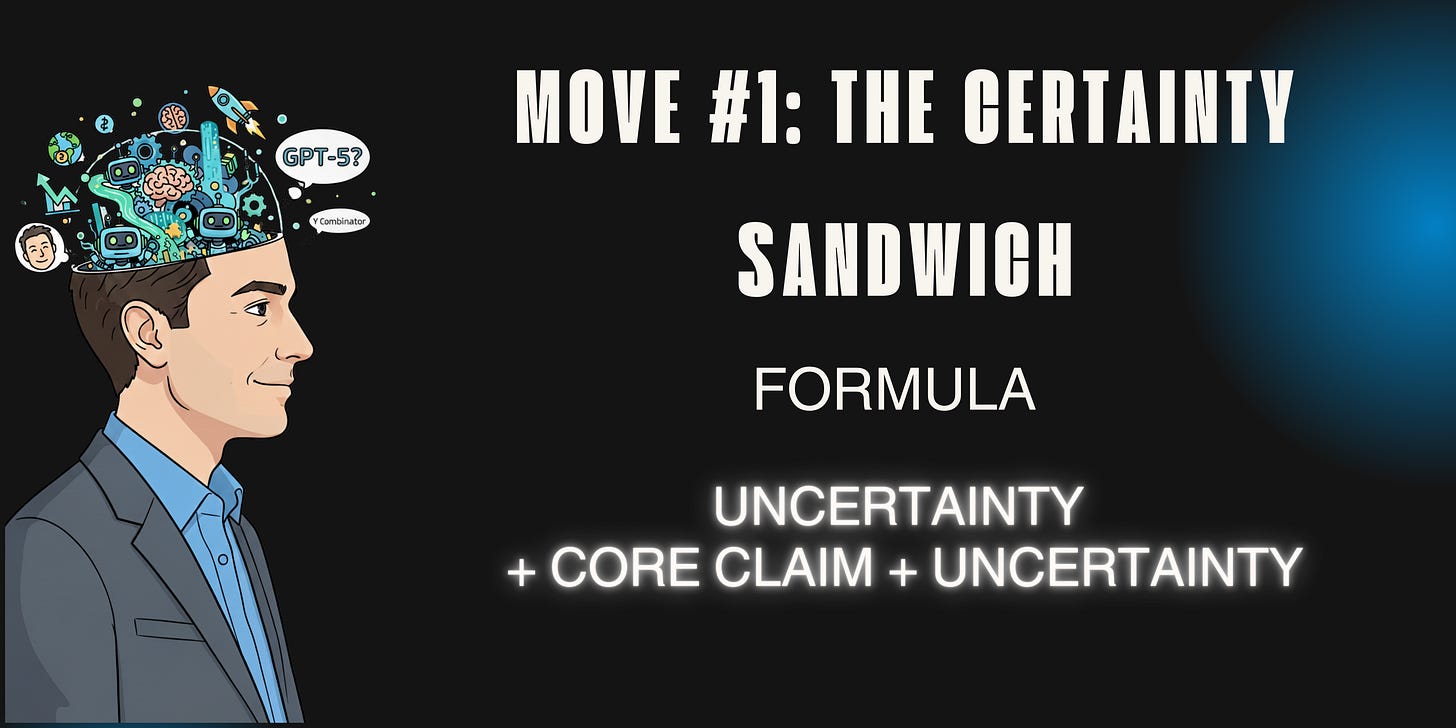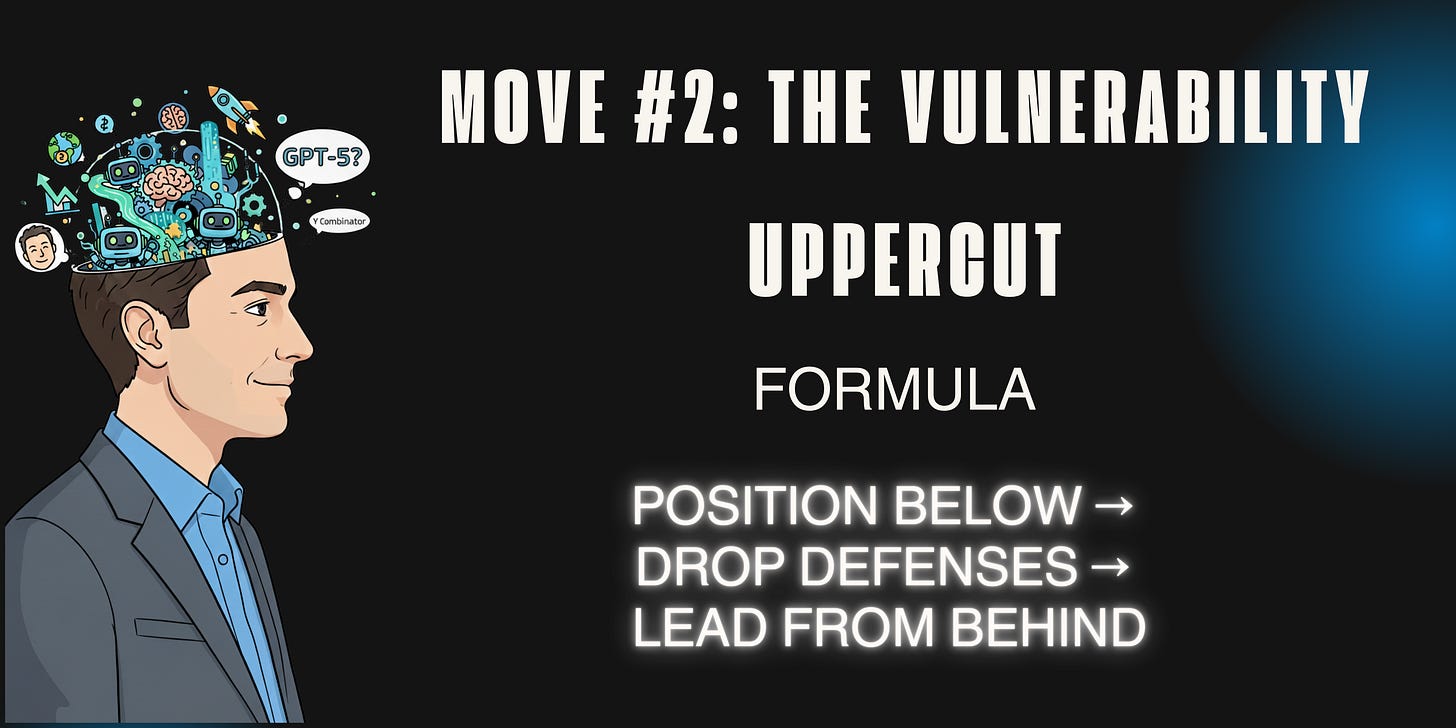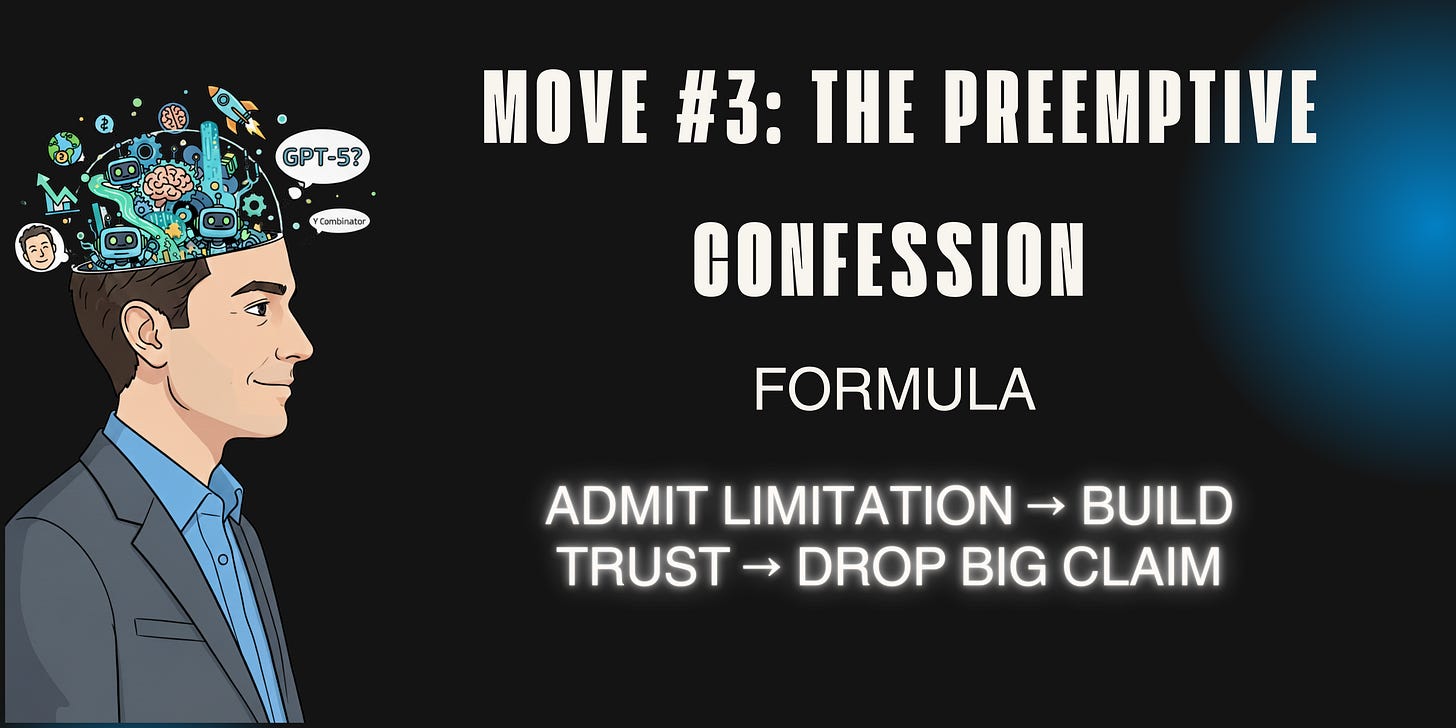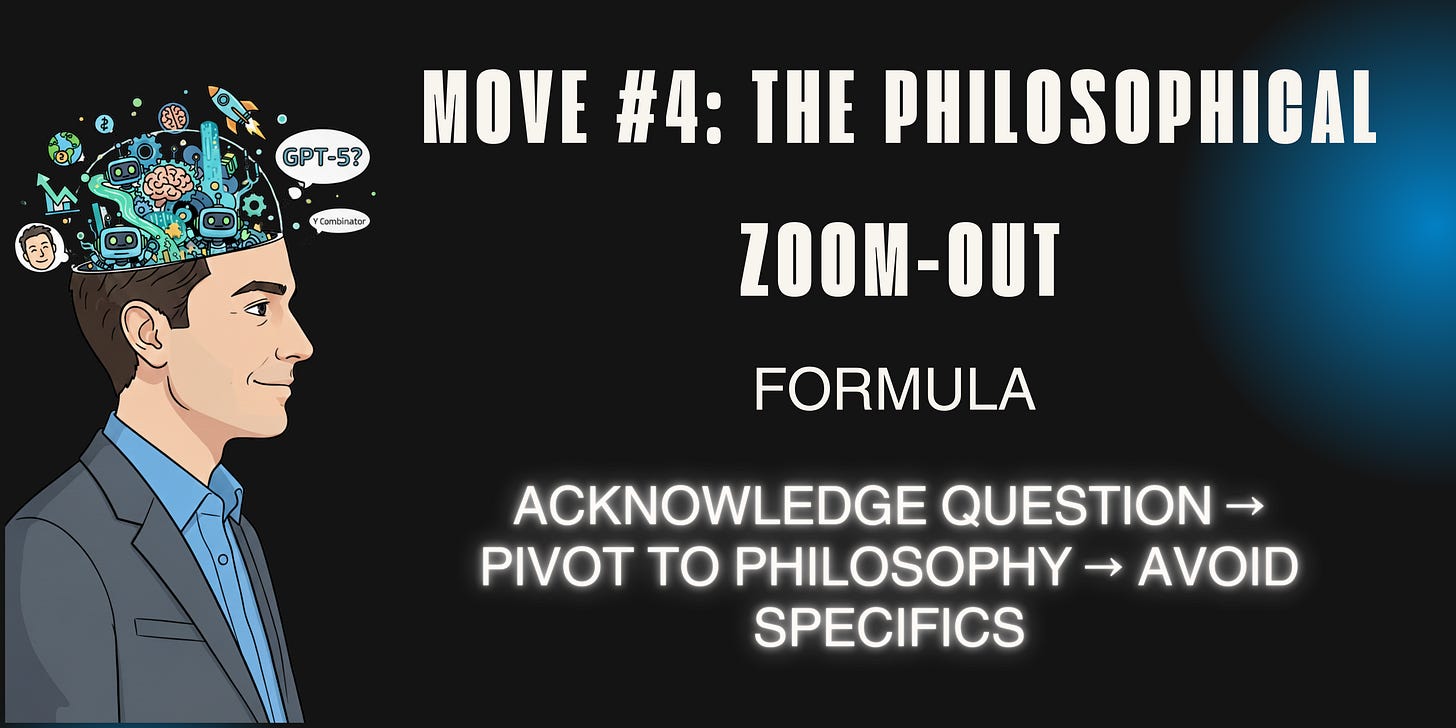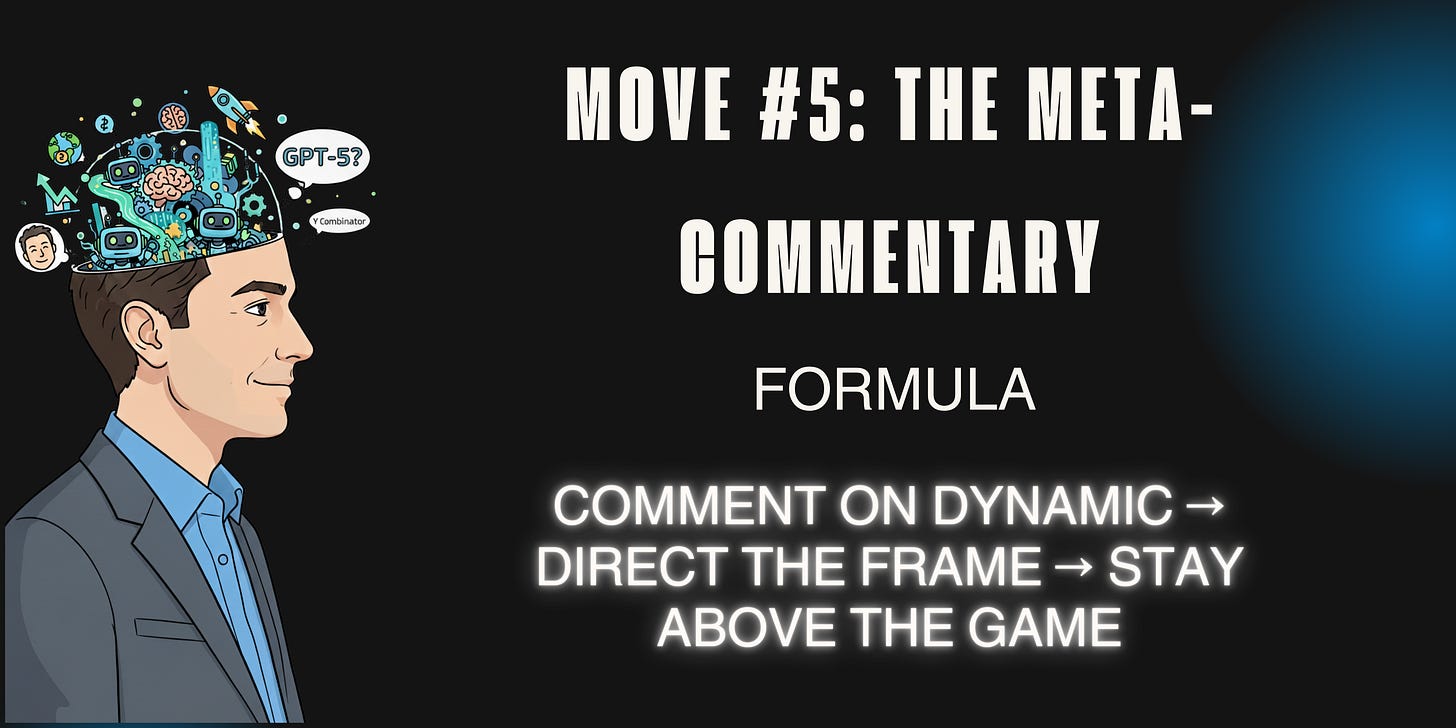The 5 Invisible Moves Sam Altman Makes in Every Interview (And Why Your Brain Falls For Them)
The most powerful CEO in tech gains trust by admitting he doesn't know where he's going. That's exactly why 3 billion people follow him there.
"I Don't Know" Is the New "Trust Me"
Sam Altman runs the most powerful AI company on Earth. He has more information about AGI than almost anyone alive. Yet in every interview, he says the same thing:
"We're stumbling through this." "Nobody really knows." "I haven't slept well since ChatGPT launched."
The man steering humanity's most transformative technology admits he doesn't know where he's going.
And that's exactly why 3 billion people trust him to take us there.
This goes beyond modesty or calculated authenticity. We're watching a psychological technique so counterintuitive that even when you know it's happening, it still works.
Tucker Carlson felt it. Theo Von called it out directly: "You're like the most charming terminator." Cleo Abram, the tech YouTuber, leaned in closer every time Altman admitted uncertainty.
They all fell for the same five moves. After reading this, so will you, even though you'll see them coming.
He's Not Confused. Confusion Is the Weapon.
After analyzing transcripts from Tucker Carlson, Theo Von, and Cleo Abram, the pattern is unmistakable. Altman doesn't eliminate confusion. He weaponizes it.
Listen to any five-minute segment and you'll hear constant uncertainty markers. "I think" peppers every other sentence. "Probably" and "maybe" appear far more than you'd expect from someone steering humanity's future.
Call it nervous rambling if you want. But it's actually precision engineering.
When Theo Von essentially called him "the most charming terminator," he had accidentally identified the technique. You're being led into an uncertain future by someone who admits they don't have a map. And that admission makes you want to follow.
Your brain is so busy processing the maybes that it doesn't resist the core message: AGI is coming, it's inevitable, and we're all in this together.
The 5 Moves That Turn Confusion Into Trust
Move #1: The Certainty Sandwich
Hide Your Biggest Claims in Plain Sight
Real example from Tucker: "I bet we can get there without it. But to provide it at the scale that humanity will demand it, I think we do need it. Because the desire to use this stuff, people are just going to want more and more."
The claim "humanity will demand massive AI scale" slides through wrapped in qualifiers.
Why it works: Your brain anchors on the middle statement while the uncertainty creates cognitive cushioning. You remember the core claim "humanity will demand massive AI scale," not the hedging around it.
Move #2: The Vulnerability Uppercut
Make Them Feel Smarter Than You (Then Lead Them Anywhere)
Formula: Position Below → Drop Defenses → Lead from Behind
Before claiming authority, he positions himself below you.
To Theo Von: "You are this impossibly charming cool guy and I'm kind of a lot more computery than you." Then immediately explains the entire future of AI.
The masterpiece example: "When I was a kid, I assumed there were always some adults in the room... Now that I am the adult in the room, I can say with certainty, no one knows where it's all going."
He literally says, "I'm in charge and I don't know what's happening." Your defenses drop. Then he leads from behind.
Move #3: The Preemptive Confession
Confess Your Weakness Before They Find It
Formula: Admit Limitation → Build Trust → Drop Big Claim
Every major claim starts with admitting a limitation.
Before selling GPT-5: "It clearly does not replicate a lot of what humans are good at."
Before discussing OpenAI's power: "I can't talk to every person at OpenAI every day."
Before claiming AI will discover new science: "Of course, it can't do things in the physical world."
By confessing weakness first, your brain categorizes him as "honest" rather than "selling." Now when the big claim comes, you're primed to accept it.
Move #4: The Philosophical Zoom-Out
Never Answer the Question They Asked
Formula: Acknowledge Question → Pivot to Philosophy → Avoid Specifics
When cornered on specifics, he pivots to philosophy.
Tucker: "Who decided what's moral for AI?" Altman: "We're really training this to be like the collective of all of humanity."
He doesn't answer WHO. He reframes to philosophy about collective intelligence.
Move #5: The Meta-Commentary
Control the Conversation By Narrating It
Formula: Comment on Dynamic → Direct the Frame → Stay Above the Game
He comments on the conversation while having it.
To Tucker: "I know he's a friend of yours and I know what side you'll..." To Theo: "I'll let you keep me on the ropes in a lot of this conversation, but..."
He's directing the movie, not just acting in it. This move gives him control from above the conversation itself.
You Feel Like He's Being Honest While He Reprograms Your Brain
Watch how these patterns work together.
The Certainty Sandwich plants ideas without resistance. The Vulnerability Uppercut dismantles defenses. The Preemptive Confession marks him as trustworthy. The Philosophical Zoom-Out avoids hard answers. The Meta-Commentary gives him narrative control.
Combined, they create something truly crazy. You feel radical transparency while actually receiving carefully managed uncertainty.
Tucker challenges him on playing God with AI morality. Watch the response cascade:
"I mean like everybody else" (vulnerability)
"I think the environment I was brought up in probably" (uncertainty)
"We consulted hundreds of moral philosophers" (authority through uncertainty)
"We need the input of the world" (we're figuring it out together)
He never actually answers who decides AI's morality. But you feel like he did.
Every Tech CEO Now Plays This Game (And We Keep Falling For It)
Once you see it, you spot it everywhere:
Zuckerberg on the metaverse: "We don't exactly know how this will play out, but we think..."
Elon on Mars: "It probably won't work, but if it does..."
They learned something traditional CEOs haven't: In an era of radical change, admitting uncertainty creates more trust than claiming certainty.
Next time you watch Altman, count the patterns. You'll see them. You'll know they're techniques.
And somehow, they'll still work.
Because uncertainty feels more honest than certainty when discussing the impossible.
The Part Nobody Tells You: You Can Do This Too
You've just learned to decode these patterns. You can spot them. You understand the psychology.
But spotting them and USING them are completely different games.
What if you could master these same techniques? What if you could build trust as effortlessly as Altman? What if your communication created the same "I trust this person even though they're uncertain" response?
Below the paywall:
4 AI Prompts That Rewire Any Message Into Strategic Persuasion — Copy-paste templates that transform bland corporate speak into Altman-level influence
Word-for-Word Scripts That Flip Resistance Into Agreement — The exact phrases that turned 37 failed negotiations into closed deals
The 5-Signal System for Reading Anyone's Real Intentions — Decode manipulation while they're still talking
The Reverse Altman Protocol — Force straight answers from the slipperiest communicators
Understanding Altman is just the beginning. The real power comes from becoming equally influential in your own way.
Keep reading with a 7-day free trial
Subscribe to Signal>Noise to keep reading this post and get 7 days of free access to the full post archives.



